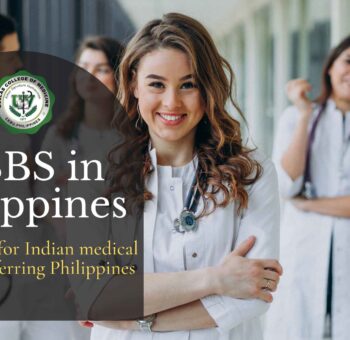Introduction
MBBS in Philippines remains the top choice of medical aspirants across the globe looking for quality education at an Affordable cost. The reviews from alumni students support the statement that most of them feel they were able to fulfill their doctor’s dreams. There are several factors supporting why medical aspirants choose to study MBBS in Philippines.
Education professionals and analysts also suggest MBBS in Philippines as the best choice for students who wish to study medicine abroad. Most Overseas Education consultants also recommend Philippines medical colleges due to the previous success ratio of students. The positive reviews from students and parents have created a craze among medical aspirants to choose the Philippines to fulfill their dreams.
About Philippines
The Republic of the Philippines is located in the Western Pacific Ocean, near the Equator. It consists of approximately seven thousand six hundred forty islands, about which two thousand islands are inhabited and form an archipelago. The country’s geography is divided into three central regions: Luzon (the largest and the north of the island, including Manila); A group of islands called Visayou Islands (including Panay, Blacks, Cebu Islands, Bohol, Leyte, Samar and Masbato); Mindanao is the second-largest island in the Philippines region, is located at the southern end of the archipelago.
The Philippines offer many explorers soul shrinking risks and majestic nature views, from the future cities to the breathtaking beaches and mountains. The country’s capital, Manila, is famous for its seaside view and the ancient Chinatown perspective. The United States had colonized the Philippines for about 50 years due to cultural intermixing; the country follows the US education system.
The tropical climate of the Philippines is usually hot and humid.
Temperatures generally vary from 21 ° C (70 ° F) to 32 ° C (90 ° F), with January being the coolest and can be the hottest month of the year.
The Philippines is home to the world’s natural wonders, such as underground rivers and rice terraces. The country welcomes its tourists for great diving points rich in biodiversity, colorful public transport, unique and mouth-watering cuisine, vibrant festivals showing their color culture, and friendly sites with residents who are considered the happiest in the world.
Speaking diplomatically, the Philippines is a founding member of the World Trade Organization, the Association of Southeast Asian Nations, the Asian Economic Cooperation Forum and the Eastern Asian Summit. The country also serves as the host for the headquarters of the Asian Development Bank. The Philippines showed a great transition to agriculture economics with services and manufacturing.
MBBS in Philippines

Before taking admission in any country, the student should have a piece of solid knowledge about the country’s physical and social attributes. The Philippines is a sovereign state in Southeast Asia in the western Pacific Ocean.
It is a beautiful country with world-class beaches and a tropical climate. Its capital city is Manila. The government has the breathtaking beauty of nature and has a mixture of different cultures and communities.
The medical curriculum in the Philippines is a combination of the MD degree [Doctor of Medicine] and the BS degree [Bachelor of Surgery]. The MD project implemented here corresponds to the MBBS of Commonwealth countries such as Great Britain, India, and Pakistan. The degree encompasses medical theory, practice, and clinical rotation, which allows students better access. The certificate earned by the Medical University of the Philippines is recognized by the World Health Organization and the Indian Medical Council.
The Philippines is known for high-quality medical education (like MBBS, MD, etc.). The top-class practical courses and experienced teachers at the Philippines Medical College are famous worldwide.
The infrastructure, the curriculum, and the atmosphere of the Philippine Medical School make it the preferred educational location for international students. Compared to other countries/regions, the cost of an entire MBBS course in the Philippines is much more affordable.
Medical University is approved by the National Medical Comission, India(NMC) and WHO. The language of instruction is English, which overcomes the main barriers to international student communication. Calculations show that in areas under USMLE, the success rate of students who completed MBBS and MD courses from the Philippines is 100%.
Students generally prefer to study MBBS in Philippines due to their low-speed structure and their USMLE relationship.
MBBS in Philippines is one of the leading destinations among Indian students to pursue MBBS. Students have access to the best theoretical and practical education that creates successful professionals in the medical field. The medical certificate obtained from the universities or the Philippines has worldwide recognition. After completing MBBS in Philippines, students can pursue PG in any country or practice doctor in India and another country after qualifying for the National Exit Examination.
How is the medical course conducted in the Philippines?
The entire course for Philippines medicine course is 6 years, one year of age, and, unlike India, the MBB course in the Philippines is called a Doctor of Medicine course.
The Philippines follow the Education System 10 + 4, while the 10 + 2 system is followed in India. Thus, the initial 16 months of the MBBS course are consumed by the bachelor’s degree in a surgery program, which strengthens a solid establishment for medical education.
The following 4 years of study are entirely associated with the study of medicines and clinical cases. At the end of the program, students undergo clinical rotations, where they have the opportunity to work for selected hospital services. Under the supervision of senior physicians, they can practice and discover drugs while treating patients.
MBBS in Philippines – General Overview
| Eligibility | Students who have 50% marks in Physics, Chemistry and Biology in their 12th standard are eligible to apply to Philippines medical colleges. For Indian Students it is mandatory to secure NEET eligibility as directed by NMC for the academic year to secure admission in Philippines MBBS college. |
| NEET Exam | Basic eligibility in NEET Exam is required for Indian Students |
| Course Pattern | BS+MD(Doctor of Medicine) |
| Course Duration | 5 year and 8 Months BS (pre Medicine) – 1 year and 2 months MD – 4 years and 6 Months (54 Months) |
| Minimum Tuition Fee | Rs. 2 Lakhs/Year |
| Maximum Tuition Fee | Rs. 6 Lakhs/Year |
| Cost of Living in Philippines | Rs 12000/Month to 18000/Month |
| Currency | Philippines Peso (PHP) |
| Time zone | UTC+8 |
| Medium of Teaching | English |
| Universities Recognition | NMC, WHO, WFME, FAIMER |
Why is MBBS in Philippines more popular?
The Philippines are known for their expansive waterfront promenades or mountains within reach and one of the best medical education and training programs. Students from all over the world hope to study here and obtain degrees from prestigious universities in the country.
The land of happiness and tranquillity offers high-quality education and a safe environment for international students. Compared to many countries, the costs are meager. The medical degree obtained from the Philippines is recognized worldwide; this helps students find jobs anywhere in the world.
The school calendar starts in June, July and ends in May. The medical academic year for studts studying MBBS in Philippines is divided into two semesters, one from June to October and from November to March. The language of instruction is English, which makes it a cheap place for many international students. The infrastructure of the medical university is far superior in terms of personnel, equipment, and technology.
Students received practical training and practical clinical examination to support their overall growth as doctors. Students from India can take the MCI screening exam after completing their medical degree from the Medical College of the Philippines. WHO and MCI recognize the MBBS or MD degree of a university in the Philippines.

Advantages of studying MBBS in Philippines
These are some well-known and worthy reasons you should prefer to study MBBS in Philippines for your medical certificate.
- No pressure to clear NEET or any other entrance examination: The education system of the Philippines does not pressure the students to go through years of studying and clear a particular exam to get into a good college. The students here are free to choose the college and check out an excellent medical program course. It is one of the best options for Indian students as they do not have to go through the NEET/ National Eligibility Entrance Test.
- No donation charges from any student: It is not hidden from anyone how colleges/ universities take lakhs of rupees as a donation and get kids admitted on their education platform. The country supports wage groups and does not take heavy contributions from anyone.
- Low academic fee: owing to this feature, the Philippines can be counted as one of the economic destinations to pursue high-end courses like MBBS. It offers quality education in the field and is a pocket-friendly option when it comes to higher studies. Be it MBBS or any other system in the Philippines; you can quickly pursue your dream education without stressing your pocket match.
- Syllabus and curriculum identical to the Indian education system: As we all know, the craze about the medical field in India. Students spend years learning the curriculum. As a cherry on top, the students study an identical syllabus in the Philippines. They share a similar curriculum; thus, if a student has completed their MBBS from the Philippines, it is easier to settle and practice his profession in India than in other countries.
- The medium of teaching is in English: We all know how important it is to be fluent in English to build your fame worldwide. It is the most common language understood and spoken and has got our backs everywhere we go. The colleges/ universities in the Philippines conduct all their classes in English mode, helping the students to understand better. Since students from all across the globe study here, a standard, well-known medium is a great choice to conduct training and practices. During clinical practice, it becomes easy for students to interact with patients in everyday language.
- They deliver the best quality education: the Philippines and serving an eye-warming natural beauty provides a soul-warming education. The country does not believe in compromises with the student’s future and gives him the best-learned teacher and an efficient study program. In addition to lectures, the seaside country also gives the students good practical sessions to be made aware of every disease and its treatment.
- Cost of living is meager: When living abroad, the most considerable tension that stresses the kid and his family is the cost of living. When it comes to the US or UK, even the bare minimum prices are hard to meet. When it comes to the Philippines, the cost required to live it is affordable by nearly all age groups. According to the research, the average price required to live in the Philippines is around 12000-15000 INR. Philippines MBBS fees is considered to be affordable compared to most other countries offering medical degree to International students.
- Philippines education is globally competitive: the studies covered by the colleges/ universities in the Philippines are recognized worldwide. The entire curriculum is prepared to keep the dynamic world in mind. The courses taught here can be used to sit in any completion the pursuer desires.
- Modern service: The colleges/ universities have modern-day training techniques and first-rate facilities and are furnished with well-established infrastructure. All the teaching centers have the latest required assets to smoothen all kids’ studying and living experiences.
- Relation between the Philippines and India degrees: The degree offered is Doctor of Medicine (MD), which is equivalent to MBBS in India. If a student cannot pursue the MBBS course in India, they can obtain the same knowledge and practice from the medical colleges in the Philippines.
These are some of the most promising advantages that the kids have by studying in the Philippines. Wrapping it up, Study MBBS in Philippines is undoubtedly a superb option for anyone and everyone interested in the medical field.
MBBS in Philippines for Indian students

MBBS in Philippines offers the dream package every Indian desires. The medical colleges there are a symbol of quality education and affordable living expenses, low academic cost, calm environment etc.
Due to the high concentration of foreign MBBS students in the Philippines, the Philippines have become the educational center of the Asia-Pacific region in recent years.
The number of Indian students studying MD / MBBS in Philippines has increased as thousands of doctors have recently been trained. Medical universities in the Philippines offer high-quality medical education and many practices at an affordable price, which has led many Indians to choose the Medical University of the Philippines over other overseas MBBS destinations.
The Philippines are one of the countries that regularly attract the consideration of medical search engines from around the world to study MBBS. If you are considering searching for your MBBS title from the Philippines but can’t decide if you should, this article could help you get some answers.
The Philippines is an Asian country and allows you to pursue your title in English. Together, it offers you to explore different cultures without limitations. The Philippines are the home of the best medical schools in the world.
This medical title provided by MBBS schools is confirmed and approved by CHED and NMC. The implementation rate in USMLE guarantees the quality of education, which is 100% here. These schools also offer placement facilities for MBBS students in the Philippines. The students are provided with innovative infrastructure and a great workforce, together with their experience of learning easy and euphoric drugs.
The Philippines offer a high expectation of education to all and is 466 universally for their excellence in training. The medical title provided here is legitimate and recognized in all parts of the world. This nation has a dazzling climate in which you never bore yourself.
Furthermore, life costs here are moderate. This country provides quality training and a brilliant life for students, so it is a considerable charm for medical students worldwide.
With NEET
Candidates willing to pursue MBBS in Philippines must qualify for the NEET examination and score a minimum of 50% marks in Physics, Chemistry, and Biology from a recognized school or Board in India. They are supposed to achieve the qualifying marks in their NEET statement, and then they can cross their entire medical course in the Philippines with zero hassles.
Without NEET
Indian students can directly admit to the BS program without qualifying for NEET’s review. But to register during the continuation of the MD, it will be mandatory to be eligible for the NEET exam and mark the minimum marks required in the course BS. Thus, a person can complete their BS course without the NEET marks statement, but it will be necessary to have eligibility in NEET before getting enrolled to MD course.
The subjects covered while studying MBBS in Philippines
- Preclinical: Related to the non-clinical department
- Anatomy
- Biochemistry: Study of the chemical process within living organisms
- The study of cells
- Biomolecules
- Enzymes
- Metabolic pathways and their regulation and metabolic interactions
- food intake and nutrition
- hormones
- molecular biology
- immunology
- environmental biochemistry
- cancer And carcinogens
- Physiology:The study of how human body works
- General Physiology
- Neuromuscular
- Blood
- Respiratory System
- Heart-Circulatory System
- Gastrointestinal System
- Nutrition
- Environmental Physiology
- Reproduction
- Kidney
- Neurophysiology
- Yoga
- Para-clinical:Dealing with laboratory tests and works
- Forensics
- Toxicology
- Microbiology:Study of microorganisms and diseases caused by them
- Bacteriology
- bacterial staining and culture
- general tests for bacterial identification
- Parasitology
- Virology
- laboratory diagnostics of viral infections
- Mycology
- Common laboratory methods for diagnosing fungal infections
- Sampling and transportation
- Host-parasite relationship
- Bacteria and virus genetics
- Infection immunity
- Immunodiagnostic
- Vaccines
- Sterilization and disinfection
- Water and bacteriology air
- Microorganisms related to gastrointestinal infections
- Gastrointestinal infections caused by parasites
- Pathology:Study of type and causes of diseases
- General pathology
- Systemic Pathology
- Pharmacology:the use of drugs
- General Pharmacology
- Autonomic Nervous System and Peripheral Nervous System
- Central Nervous System
- Autoantibodies
- Cardiovascular System
- Gastrointestinal System and Respiratory System
- Chemotherapy
- Clinical: To be conducted in a clinic
- Anesthesiology
- Community Medicine:the study of human behaviour
- Behavior Science
- Health education
- Environment
- Biostatistics
- Epidemiology
- Nutrition
- Maternal and child health care
- Rehabilitation
- Epidemiology of infectious and non-communicable diseases
- Major national health projects
- Occupational medicine
- Health administration
- Health economics
- Geriatrics Medicine
- Consultation
- Dermatology: the study of skin, hair etc diseases
- Venereology Skin diseases:
- infectious skin diseases
- parasites, melanin synthesis
- allergic diseases
- Drug eruptions
- Urticaria
- erythema multiforme
- vesiculobullous disease
- epi dermopathy
- psoriasis Diseases
- Pathogenesis
- Syphilis
- gonococcal and nongonococcal infections
- HIV infections
- dermatological emergencies
- Medicine: the study of human body and different infections
- clinical pharmacology
- nutritional and metabolic disorders
- electrolyte and acid-base imbalances
- intensive care medicine
- pain treatment and palliative medicine
- Medical Psychiatry
- Poisoning
- Specific Environmental and Occupational Hazards
- Immune Responses and Infections
- Cardiovascular System
- Obstetrics & Gynaecology: The study of male and female private parts
- Basic Sciences,
- Obstetrics,
- Gynaecology,
- Contraception,
- Neonatology and Recent Advance
- Ophthalmology: the study of the eye
- Microbiology
- Pathology
- Pharmacology
- Eyelids disorders
- Lacrimal Apparatus disorders
- Conjunctivitis and Ophthalmia Neonatorum
- Trachoma & Other chronic conjunctivitis
- Keratitis and corneal ulcers
- Corneal ulcer
- Scleritis & Episcleritis
- Orthopedics: Related to bones
- trauma therapy
- medicine and rehabilitation
- orthopedic neurology
- spinal diseases
- Radiology
- fractures
- Otorhinolaryngology:Study of ear and nose diseases
- Oral cavity and oropharynx
- Ear, Instruments
- Operative Procedures
- X-ray
- Pediatrics: Related to infants and kids
- Growth and development
- Nutrition
- Immunity
- Infectious diseases
- Hematology
- Respiratory system
- gastrointestinal tract
- central nervous system
- cardiovascular system
- genitourinary system
- neonatology, pediatric emergency
- liquid electrolysis
- Genetics
- behavioral problems
- pediatric surgical problems
- Psychiatry: Related to human emotions and nature
- behavioral sciences
- emotion and its application in health
- cognitive process disorders
- personality disorders
- Schizophrenia
- bipolar disorder
- Depression
- anxiety Neurosis
- phobia and obsessive-compulsive disorder
- Surgery: The surgical treatment of diseases
- Skin
- head and neck area
- Arteries
- Veins
- Breasts
- Esophagus
- stomach and duodenum
- small intestine
- large intestine and rectum
- Appendix
- acute abdomen
- urology
Eligibility Criteria
- The students need to clear the 10+2 exam with a recognized board and score at least 50% in Physics, Chemistry, and Biology as compulsory subjects.
- For reserved category students- ST/SC/OBC, the marks criterion of 10+2 is 40%.
- The students must have scored at least the qualifying marks in the NEET examination.
- In case the students are giving the NTA exam, a cut-off list is issued every year.
- The student’s age must be between 17 to 25 at the time of admission and not more and less.
Admission process to study MBBS in Philippines.
- The students are to fill the college/ university application form.
- Further, they must submit the soft copies of their passport and other vital documents as stated below.
- If the student is selected, they are sent an admission letter from the university.
- As the student confirms their admission to their desired college, the immigration procedure starts.
- They are then given the invitation letter on visiting the Philippines Embassy in Delhi.
- Finally, all the documents submitted are checked, evaluated and verified, and then the student has to apply for a visa.
Documents Required
- 10th standard mark sheet from a recognized education board
- 12th standard mark sheet from a recognized education board
- Passport size photographs of the student
- Invitation letter given by the Philippians Embassy in Delhi
- The student’s passport
- The Student Visa
- Covid-19 test report (since 2020)
- HIV test report of the candidate
- Medical insurance
- Birth certificate
- Identity proof (Aadhar card, Pan card)
The date of birth on all copies should be the same.
Factors to consider when deciding which college to choose in the Philippines:
- The name and fame of the medical school/university. The age is also to be noted.
- The type and quality of education offered, for instance, the teaching Methodology, types of equipment etc.
- Check whether the university is recognized by the World Health Organization(WHO) and the Medical Council of India(MCI)
- The clinical practice performed, the number of affiliated hospitals connected, number of beds etc
- Infrastructure / Facilities such as Library, In-Campus Hostel, fooding etc.
- The location, the college is situated in and the average Out-Patients per Day
- The availability of Indian food vegetarian/non-vegetarian. It is not possible to live without our homeland dishes.
- Separate hostels for boys and girls and student security
- Tuition Fees for the medical course and the living cost related to the college/ university.
The Philippines are very secure for students
The Philippines is a country dominated by women, where females prevail in all workplaces that include over 60% of the population.
It is safe for both boys and girls. The country is a mixture of different cultures, which makes this country friendly and offers students a further advantage so as not to be treated as external or foreigners. Students studying here feel relaxed and comfortable with a friendly environment and focus better on their studies.
Eligibility, Course Duration and Fee Structure for Indian Students(Overview)
The Philippines provides world class medical education to students from all around the world. They have a medical education system similar to the USA and India. It has been stated after several researches that 1 out of 10 American doctors is passed from the Philippines medical education system.



